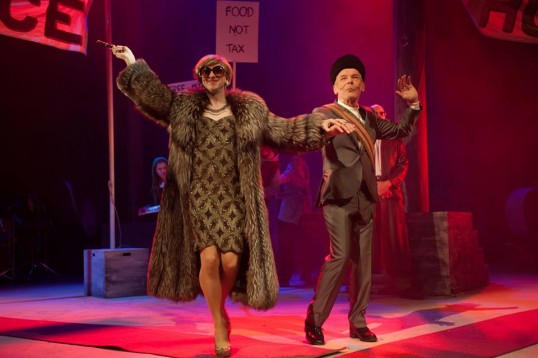The Caucasian Chalk Circle
✭✭✭✭✩ Energy and focus
Royal Lyceum Theatre: Wed 18 Feb – Sat 14 Mar 2015
Exhilarating and involving, The Caucasian Chalk Circle makes great use of the resources available to the Lyceum. There is an uncontrolled feeling to much of the production that is paradoxically a tribute to the careful craft and intelligence on display.
Brecht’s story tells of Grusha, a kitchen maid who rescues the Governor’s infant son during a revolution and comes to think of the child as her own. Her adventures take on an epic quality, dealing with truth, justice and politics, while also keeping a personal dimension.
Anyone who believes that Brecht is somehow dry or overly preachy should see this audaciously noisy, headlong romp that engages the heart as least as much as the brain.
From the outset, there is a rambunctious energy to proceedings. The uniformly excellent 13-strong cast are in evidence even before the play begins, and remain in constant motion, as do the items of furniture on Karen Tennent’s thrillingly exposed stage.
Simon Wilkinson’s impressive lighting helps to reinforce the feel of conflict as the uprising of the first act begins. However, in true Brechtian style, this is no attempt to produce a traditional suspension of disbelief. Instead, cast members appear through the auditorium, often with instruments as they play Claire McKenzie’s intense music.
At first, this music has the air of a demented marching band and threatens to overwhelm the action. Having made its dramatic point, however, the musical accompaniment is used more sparingly as the action progresses, travelling through a variety of genres.
ingenious theatrical touches
There are some careful variations of pace in Mark Thomson’s direction, but there is always an underlying intelligence that makes a coherent whole out of what could have ended up as a ragbag. The use of the auditorium and some ingenious theatrical touches are always at the service of the production as a whole.
The cast take on a variety of roles, with John Kielty’s versatility particularly impressing. There are a number of intriguing pieces of cross-gender casting, notably Deborah Arnott’s lascivious Sergeant, Shirley Darroch’s cartoonish, villainous Prince Izbeki and a performance as the Governor’s wife by Jon Trenchard that is played for laughs while retaining a real truth.
Amy Manson’s Grusha provides the focus in the first half, with an effective portrayal of guileless sympathy that puts the behaviour of others into sharp focus as she attempts to retain her humanity in a world in turmoil.
If the second half lacks the boisterous propulsion of the first, it is nevertheless given considerable momentum by Christopher Fairbank’s scoundrel turned judge Azdak. His larger than life depiction of the cynical lawgiver who is happy to stick up for the downtrodden, just as long as the appropriate ‘donations’ never dry up, speaks volumes about the continuing link between access to justice and the ability to pay.
In the end, however, this is one of Brecht’s tenderest plays, and the cast manage to walk a fine line between cynicism and sentimentality. This is helped greatly by Sarah Swire’s Singer, the indie-styled narrator figure who drives the story forward with both vulnerability and steeliness.
Alistair Beaton’s translation provides much of the energy on display. There are some questions about some of his changes – for example, the collective farm dispute of the original prologue has become a vaguer discussion of ‘agribusiness’. This reflects a certain lack of focus in some of the text, which also occasionally falls short on the poetry. However, any such deficiencies are more than overcome by the compulsive, freewheeling drive that makes this production such a success.
Running time 2 hours 45 mins (including interval)
Royal Lyceum Theatre, Grindlay Street EH3 9AX
Run ends Sat 14 March 2015
Tuesdays to Saturdays at 7.30 pm, Wednesdays and Saturdays at 2.00 pm
Tickets from http://www.lyceum.org.uk/
ENDS






















